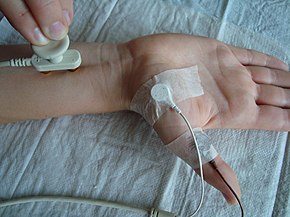
Back دراسة توصيل العصب Arabic Nervenleitgeschwindigkeit#Messung German 神経伝導速度検査 Japanese Elektroneurografia Polish Estudo da condução nervosa Portuguese
| Nerve conduction study | |
|---|---|
 Nerve conduction study | |
| Purpose | evaluate the motor and sensory nerves |
A nerve conduction study (NCS) is a medical diagnostic test commonly used to evaluate the function, especially the ability of electrical conduction, of the motor and sensory nerves of the human body. These tests may be performed by medical specialists such as clinical neurophysiologists, physical therapists,[1] physiatrists (physical medicine and rehabilitation physicians), and neurologists who subspecialize in electrodiagnostic medicine. In the United States, neurologists and physiatrists receive training in electrodiagnostic medicine (performing needle electromyography (EMG) and NCSs) as part of residency training and in some cases acquire additional expertise during a fellowship in clinical neurophysiology, electrodiagnostic medicine, or neuromuscular medicine.[2][3][4] Outside the US, clinical neurophysiologists learn needle EMG and NCS testing.
Nerve conduction velocity (NCV) is a common measurement made during this test. The term NCV often is used to mean the actual test, but this may be misleading, since velocity is only one measurement in the test suite.
- ^ "Specialist Certification: Clinical Electrophysiology". Archived from the original on 2018-10-17. Retrieved 2018-10-17.
- ^ "Archived copy" (PDF). Archived from the original (PDF) on 2014-04-18. Retrieved 2015-01-19.
{{cite web}}: CS1 maint: archived copy as title (link) - ^ "Archived copy" (PDF). Archived from the original (PDF) on 2014-12-26. Retrieved 2014-12-26.
{{cite web}}: CS1 maint: archived copy as title (link) - ^ "Archived copy" (PDF). Archived from the original (PDF) on 2014-12-26. Retrieved 2015-01-19.
{{cite web}}: CS1 maint: archived copy as title (link)
© MMXXIII Rich X Search. We shall prevail. All rights reserved. Rich X Search